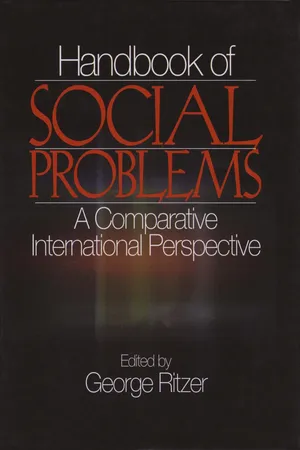
- 704 pages
- English
- PDF
- Available on iOS & Android
About this book
"Ritzer?s Handbook of Social Problems offers a comprehensive treatment of today?s major societal issues. The articles are authored by some of the top scholars in the field and address problem areas that will capture the interests of students and professors alike. The international coverage is most welcome in this time of intensifying global inequalities."
-Nancy Jurik,
Arizona State University
The Handbook of Social Problems: A Comparative International Perspective provides a unique, broadly comparative perspective on the current state of social problems and deviance in a variety of societies around the world. Editor George Ritzer, along with leading U.S. and international sociologists, examines the relationship between social problems and a society?s level of development and affluence.
The essays in this volume focus on four interrelated issues involved in the relationship between social problems and the level of development and affluence:
· Less developed and less affluent societies are more likely to experience a range of social problems than developed and affluent societies.
· Affluence causes or at least brings with it a series of social problems that do not exist in less affluent societies.
· It is only with affluence that certain things can come to be imagined as social problems, such as excessive consumption.
· The very affluence of a society makes it vulnerable to problems that would not be social problems in poorer societies.
The Handbook explores the theory of the weakness of the strong—in other words, strong or wealthy nations may have greater vulnerability to some social problems than less developed or affluent societies. This theory is clearly illustrated in this volume by the aftermath of September 11, 2001depicting the vulnerability of the U.S. to social problems in far-removed corners of the world. In addition, the international and comparative essays in this volume cover other important issues such as the impact of modern technologies on social problems, ecological problems, global inequality, health as a social problem, and much more. The Handbook of Social Problems is a vital resource for sociologists and graduate students, as well as an excellent addition to any academic library.
Frequently asked questions
- Essential is ideal for learners and professionals who enjoy exploring a wide range of subjects. Access the Essential Library with 800,000+ trusted titles and best-sellers across business, personal growth, and the humanities. Includes unlimited reading time and Standard Read Aloud voice.
- Complete: Perfect for advanced learners and researchers needing full, unrestricted access. Unlock 1.4M+ books across hundreds of subjects, including academic and specialized titles. The Complete Plan also includes advanced features like Premium Read Aloud and Research Assistant.
Please note we cannot support devices running on iOS 13 and Android 7 or earlier. Learn more about using the app.
Information
Table of contents
- Cover
- Contents
- Preface
- Part I - Introduction
- Chapter 1 - Social Problems: A Comparative International Perspective
- Chapter 2 - Theoretical Issues in the Study of Social Problems and Deviance
- Chapter 3 - Methodological Issues in the Study of Social Problems
- Chapter 4 - Social Problems and Public Policy
- Part II - Social Problems
- Chapter 5 - Population Change
- Chapter 6 - Ecological Problems
- Chapter 7 - Global Inequality
- Chapter 8 - Racism in Comparative Perspective
- Chapter 9 - Ethnic Conflict as a Global Social Problem
- Chapter 10 - Gender Inequality
- Chapter 11 - Urban Problems in Global Perspective
- Chapter 12 - Work-Related Social Problems
- Chapter 13 - The Media and Social Problems
- Chapter 14 - Consumption as a Social Problem
- Chapter 15 - Family Problems in Global Perspective
- Chapter 16 - Racial and Ethnic Educational Inequality in Global Perspective
- Chapter 17 - Health as a Social Problem
- Chapter 18 - How Medical Care Systems Become Social Problems
- Chapter 19 - AIDS as a Social Problem: The Creation of Social Pariahs in the Management of an Epidemic
- Chapter 20 - War, Militarism, and National Security
- Chapter 21 - Sea Change: The Modern Terrorist Environment in Perspective
- Chapter 22 - The Rhetoric and Reality of "Mass Destruction": How Genocide Became an International Social Problem
- Chapter 23 - Globalization
- Chapter 24 - Technology and Social Problems
- Chapter 25 - The Internet as a Global Social Problem
- Chapter 26 - Risk
- Chapter 27 - Crime
- Chapter 28 - Juvenile Delinquency
- Chapter 29 - Drug Use as a Global Social Problem
- Chapter 30 - The Sexual Spectacle: Making a Public Culture of Sexual Problems
- Chapter 31 - Modern-Day Folk Devils and the Problem of Children's Presence in the Global Sex Trade
- Chapter 32 - Mental Illness as a Social Problem
- Chapter 33 - Disability as a Global Issue
- Chapter 34 - Corruption as a Global Social Problem
- Index
- About the Editor
- About the Contributors